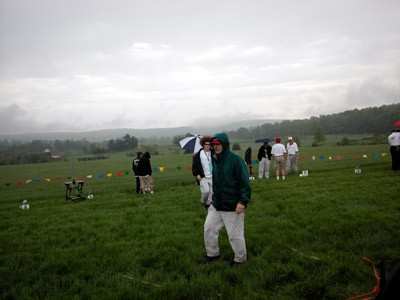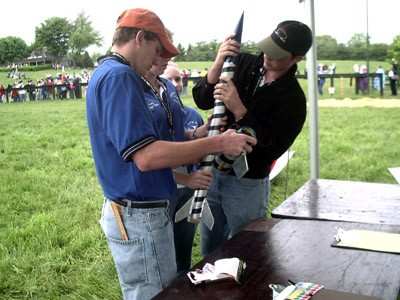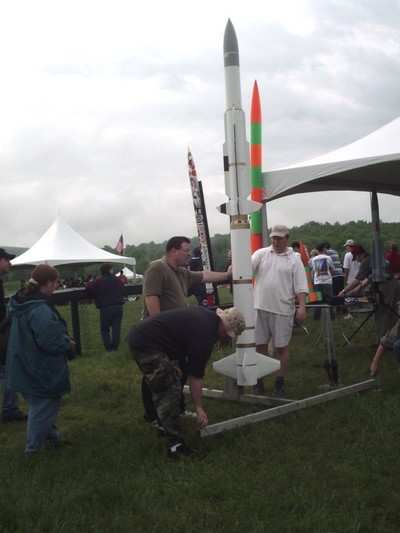How Do You Want Your Payload: Boiled Or Over Easy?
A team of seventh and eighth-graders from Discovery Middle
School in Madison (AL), will compete in the world's largest model
rocket contest Saturday, May 22, in The Plains (VA).

Let's just hope the weather is better this year than it was
last.
The Team America Rocketry Challenge, a national amateur rocket
competition for high school and middle school students, is a
partnership between NASA and Rocketry Challenge sponsors - the
Aerospace Industries Association of America and the National
Association of Rocketry.
The Discovery Middle School team is one of 100 teams - from a
field of more than 600 middle and high school teams representing
more than 7,000 students - scheduled to participate in Saturday's
competition.

Student teams were asked to design, build and test a model
rocket that could reach an altitude as close to 1,250 feet as
possible with a payload of two raw eggs, and then parachute the
eggs back to the ground, unbroken. A contest-approved barometric
altimeter must be flown inside the rocket to record the peak
altitude of the rocket flight.
At the March 7 regional fly-off in Huntsville, the Discovery
team's rocket reached an almost-perfect altitude of 1,240 feet and
returned its payload to Earth unbroken. The 100 teams closest to
the specified altitude were invited to participate in the final
Rocketry Challenge competition.
"The students were really committed to the project, and I'm so
proud of them," said Robin Dauman, an enrichment specialist at
Discovery Middle School. "Of the 12 Alabama teams to qualify, our
students were closest to the altitude requirement, and the only
state team that will be in the national competition."
Dauman worked with 11 students who signed on to the project and
committed to the fly-off trial. Six of those students will
participate in the Virginia competition. The team consists of
eighth-graders Arik Schwartz, Patrick Sanders, Cobb Brandon,
Karthik Sola, Ajesh Khajinow, and seventh-grader Jonathan
McCoy.

Charles Pierce, a NASA liquid propulsion engineer at the
Marshall Space Flight Center in Huntsville (AL), serves as the
team's advisor and mentor. He is president of the Huntsville Area
Rocketry Association, which has supported regional rocketry teams
participating in the Challenge by providing mentors and certifying
results for Rocketry Challenge sponsors.
The 25 top-finishing teams in Saturday's competition will become
eligible to submit proposals to participate in the 2004-2005 NASA
Student Launch Initiative, an educational activity designed to
motivate students toward careers in science, math and engineering,
while giving them a taste of practical, hands-on aerospace
work.
The program, based at the Marshall Center and now in its fourth
year, seeks to inspire students to design, build and launch
reusable rockets and real science payloads.
Three of those top-25 teams will then be selected to partner
with the Marshall Center and will receive a grant of up to $2,500
and a travel allowance for up to 10 student and faculty
representatives. Included will be meals, lodging and transportation
to and from the launch activities in Huntsville. The three teams
will also be invited to attend Space Camp at the US Space &
Rocket Center in Huntsville.

"Every mission that NASA accepts requires the sharpest of minds,
the strength of purpose and the drive to take on new challenges,"
said Jim Pruitt, manager of Marshall's Education Programs
Department. "Young people like those involved in Team America
Rocketry Challenge will be needed in NASA's future missions.
Preparing our young people for the challenges ahead is important to
fulfilling the Vision for Space Exploration, which calls for NASA
to return humans to the Moon and lay the groundwork for exploration
missions to Mars and beyond."
 Aero-News: Quote of the Day (10.24.25)
Aero-News: Quote of the Day (10.24.25) ANN's Daily Aero-Linx (10.24.25)
ANN's Daily Aero-Linx (10.24.25) NTSB Final Report: Cirrus SR22
NTSB Final Report: Cirrus SR22 Airborne-Flight Training 10.23.25: PanAm Back?, Spirit Cuts, Affordable Expo
Airborne-Flight Training 10.23.25: PanAm Back?, Spirit Cuts, Affordable Expo Airborne 10.22.25: Rez Takes Plane, DJI v US Drone Ban, HK 747 Cargo Accident
Airborne 10.22.25: Rez Takes Plane, DJI v US Drone Ban, HK 747 Cargo Accident






